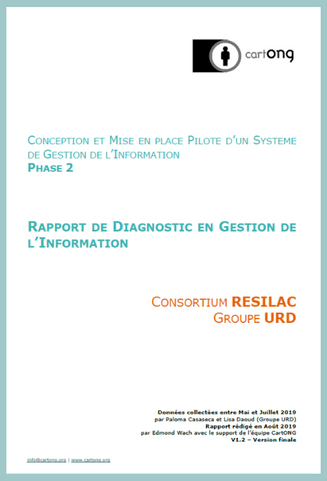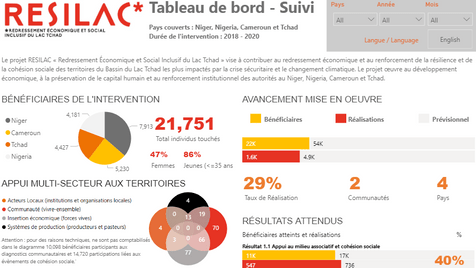
Structuring and strengthening IM for the RESILAC project
About
Description
The RESILAC project, focused on the Inclusive Economic and Social Recovery of Lake Chad, had identified from its inception the need to improve its Information Management (IM). This international consortium, involving Action Against Hunger (ACF), CARE, and Groupe Urgence Réhabilitation Développement (URD), was operating in the Lake Chad Basin with the aim of strengthening the resilience and social cohesion of the regions most affected by the security crisis and climate change.

In 2019, CartONG initiated a comprehensive Information Management needs assessment. This assessment formalized the stakeholders and their needs, analyzed the consortium’s organization and existing data management practices, identified constraints, opportunities and challenges. The data collection methodology was developed by CartONG, which then remotely supported (due the COVID pandemic) the project’s MEAL (Monitoring, Evaluation, Accountability and Learning) team in collecting the data required for the assessment at regional level and in 3 of the 4 intervention countries. These data were then reviewed and analyzed jointly by CartONG and the consortium, with a view to proposing ways of improving and structuring the Information Management component of the RESILAC project.
Following on from this analysis, CartONG supported the RESILAC project in 2020 and 2021 in implementing its recommendations. First of all, CartONG was able to guide the consortium members on certain strategic and methodological aspects, such as verifying the level of application of Data Protection laws, or reviewing the operating processes (roles, access, etc.) of the tool used for file sharing.
This support took the form of written recommendations and guidelines, leaving it up to the consortium members to coordinate the change actions envisaged.
At the same time, CartONG supported the consortium members in setting up a system for centralizing and reporting national data, using a Database system to assess all the services provided to each beneficiary. CartONG also designed a regional dashboard for the project, based on the PowerBI data visualization tool. This dashboard is based on a pre-existing reporting file and enables NGOs and donors to visualize the project’s achievements. Maps based on data collected during the project have also been produced.

In 2021, in addition to the activities already carried out, CartONG has organized a series of training courses for teams in the field to improve data culture (or “data literacy”) within the project, and thus their ability to understand and use data for their operational needs and for increased accountability.
A learning paper has been produced to enable learning to be shared with the sector: https://www.im-portal.org/help-library/papier-capitalisation-pratiques-gestion-information-projet-resilac.

